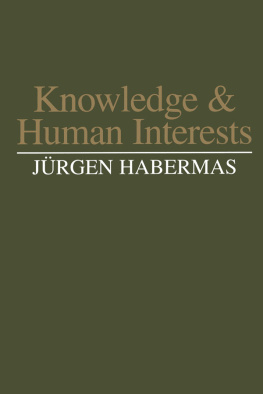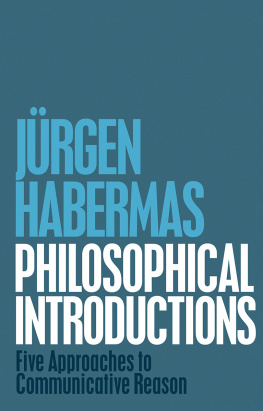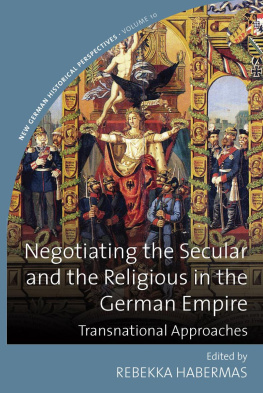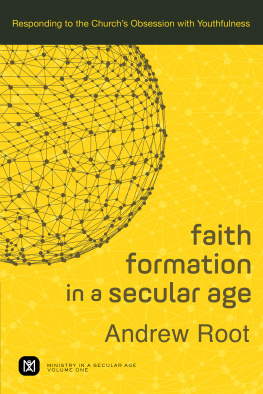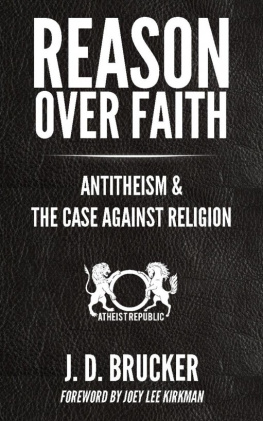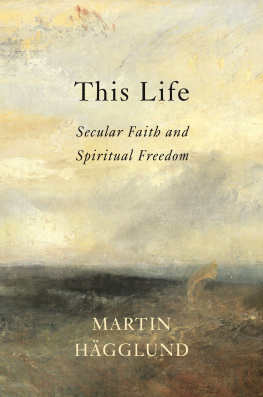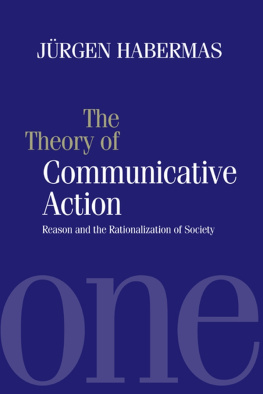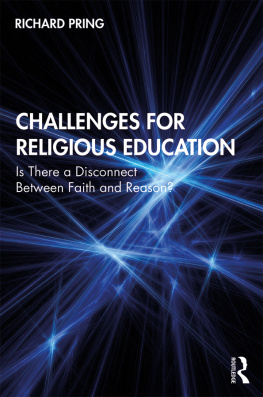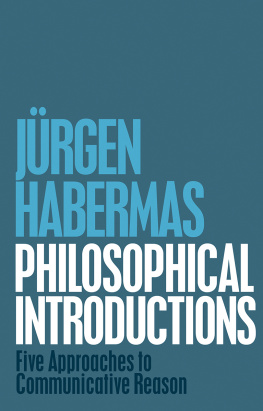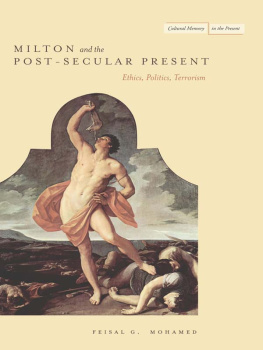Habermas - An awareness of what is missing faith and reason in a post-secular age
Here you can read online Habermas - An awareness of what is missing faith and reason in a post-secular age full text of the book (entire story) in english for free. Download pdf and epub, get meaning, cover and reviews about this ebook. City: Cambridge, year: 2015;2014, publisher: Wiley;Polity, genre: Religion. Description of the work, (preface) as well as reviews are available. Best literature library LitArk.com created for fans of good reading and offers a wide selection of genres:
Romance novel
Science fiction
Adventure
Detective
Science
History
Home and family
Prose
Art
Politics
Computer
Non-fiction
Religion
Business
Children
Humor
Choose a favorite category and find really read worthwhile books. Enjoy immersion in the world of imagination, feel the emotions of the characters or learn something new for yourself, make an fascinating discovery.
An awareness of what is missing faith and reason in a post-secular age: summary, description and annotation
We offer to read an annotation, description, summary or preface (depends on what the author of the book "An awareness of what is missing faith and reason in a post-secular age" wrote himself). If you haven't found the necessary information about the book — write in the comments, we will try to find it.
Habermas: author's other books
Who wrote An awareness of what is missing faith and reason in a post-secular age? Find out the surname, the name of the author of the book and a list of all author's works by series.
An awareness of what is missing faith and reason in a post-secular age — read online for free the complete book (whole text) full work
Below is the text of the book, divided by pages. System saving the place of the last page read, allows you to conveniently read the book "An awareness of what is missing faith and reason in a post-secular age" online for free, without having to search again every time where you left off. Put a bookmark, and you can go to the page where you finished reading at any time.
Font size:
Interval:
Bookmark:


First published in German as Ein Bewutsein von dem, was fehlt Suhrkamp Verlag Frankfurt am Main 2008
This English edition Polity Press, 2010
Polity Press
65 Bridge Street
Cambridge CB2 1UR, UK
Polity Press
350 Main Street
Malden, MA 02148, USA
All rights reserved. Except for the quotation of short passages for the purpose of criticism and review, no part of this publication may be reproduced, stored in a retrieval system, or transmitted, in any form or by any means, electronic, mechanical, photocopying, recording or otherwise, without the prior permission of the publisher.
ISBN-13: 978-0-7456-4720-3 (hardback)
ISBN-13: 978-0-7456-4721-0 (paperback)
ISBN-13: 978-0-7456-9470-2 (epub)
ISBN-13: 978-0-7456-9377-4 (mobi)
A catalogue record for this book is available from the British Library.
The publisher has used its best endeavors to ensure that the URLs for external websites referred to in this book are correct and active at the time of going to press. However, the publisher has no responsibility for the websites and can make no guarantee that a site will remain live or that the content is or will remain appropriate.
Every effort has been made to trace all copyright holders, but if any have been inadvertently overlooked the publisher will be pleased to include any necessary credits in any subsequent reprint or edition.
For further information on Polity, visit our website: www.politybooks.com
The translation of this work was supported by a grant from the Goethe-Institut which is funded by the German Ministry of Foreign Affairs.
NORBERT BRIESKORN, S. J. is Professor of Social and Legal Philosophy at the Jesuit School for Philosophy in Munich and is a member of its Institute for Social Policy.
JRGEN HABERMAS is Emeritus Professor of Philosophy at Frankfurt University.
MICHAEL REDER is Adjunct Professor of Social Philosophy and Philosophy of Religion at the Jesuit School for Philosophy in Munich and is a member of its Institute for Social Policy.
FRIEDO RICKEN, S. J. is Emeritus Professor of the History of Philosophy and Ethics at the Jesuit School for Philosophy in Munich.
JOSEF SCHMIDT, S. J. is Professor of Philosophical Theology and the History of Philosophy at the Jesuit School for Philosophy in Munich and Director of its Institute for the Philosophy of Religion.
What is meant when contemporary society is described as post-secular? With this concept, Jrgen Habermas has exercised a major influence on the recent debate concerning the social role and importance of religion. This is clearly testified by the widespread public response to his speech on receiving the Peace Prize of the German Book Trade in 2001, and the discussion with the then Cardinal Ratzinger at the Catholic Academy in Munich in 2004. At the center of Habermas's reflections on this issue are the questions of the relation between faith and reason and of the relation between secular and religious citizens. He challenges reason to reflect on what it is missing and on its relation to religion.
The contributors to this volume take up Habermas's challenge to reflect on the awareness of what is missing. Their remarks are intended as contributions to the conversation with the philosopher and they wish to provide encouragement to continue the debate. The texts originated in a podium discussion between Habermas and the representatives of the Jesuit School for Philosophy Norbert Brieskorn, Michael Reder, Friedo Ricken, and Josef Schmidt which took place in Munich in February 2007. Habermas's contribution was followed by a lively and stimulating debate. For this volume, the participants have developed their reflections further in their contributions, into which arguments from the plenary discussion on that occasion have also found their way.
October 2007
Habermas and Religion
MICHAEL REDER AND JOSEF SCHMIDT, S. J.
Religion is once more a topic of debate. It is once again being increasingly perceived as a social phenomenon, a development not prompted solely by the events of September 11, 2001. Against the background of the sociological debate on secularization of the 1970s and 1980s, in western countries religions seemed destined to lose ever more of their importance with progressive modernization and individualization. Yet this hypothesis has not been confirmed; on the contrary, today religions play an extremely important role in western societies.
The social traces of religions are to be found primarily in two domains. On the one hand, they take positions on political questions or engage in public debates. This phenomenon has undoubtedly been reinforced in Germany by the fact that Pope Benedict XVI has drawn renewed attention to the Christian Churches. However, the many other religious communities be they Islamic, Buddhist, or Hindu are also becoming increasingly important actors within western civil societies.
On the other hand, religion in these countries has undergone a multifaceted transformation, for religious symbols and language games are being transposed into other, not genuinely religious, domains. Unmistakable borrowings from religious traditions can be found in film, theater, and advertisement and in how mass events are orchestrated. In the process, the semantic and symbolic potentials of religions are becoming a universal social resource which shapes public and cultural life in a whole variety of ways.
The social significance of religion is becoming even more clearly apparent from a global perspective, for today religious communities play an important public role in very many regions of the world. They shape the individual practical attitudes of human beings in a variety of cultural ways, they influence cultural life, and they are part of public discourses and political processes. As a result, religions represent an important factor which merits attention when analyzing social developments in many parts of the world. Religion has also become a central topic on the global political stage, especially since September 11, 2001. Today global political strategies are difficult to conceive without reference to the relation between religion and politics.
Thus the discourse concerning secularization has also undergone a pronounced change. In spite of enduring trends towards secularization in certain regions (for instance, in eastern Germany), today almost nobody speaks of an imminent extinction of religions or of the religious any longer. Common sense seems to dictate that, although religions have changed profoundly and have been in part transformed during the modern and postmodern eras, they nevertheless remain a phenomenon of major social importance in particular as regards the global situation. Thus the return of the gods to quote the title of a book by Friedrich Wilhelm Graf (Graf 2004) is not strictly speaking a return; what we are witnessing is rather a renewed attention to the religious, even if the latter today appears in a new garb.
Philosophy, too, has dealt with this phenomenon extensively in recent years. One need only think of the conference which took place on the island of Capri in 1994, in which Jacques Derrida, Gianni Vattimo, and Hans-Georg Gadamer participated, among others (Derrida and Vattimo 1998). The volume The Future of Religion edited by Richard Rorty and Gianni Vattimo in 2006 is a further expression of this revived interest (Rorty and Vattimo 2006).
Next pageFont size:
Interval:
Bookmark:
Similar books «An awareness of what is missing faith and reason in a post-secular age»
Look at similar books to An awareness of what is missing faith and reason in a post-secular age. We have selected literature similar in name and meaning in the hope of providing readers with more options to find new, interesting, not yet read works.
Discussion, reviews of the book An awareness of what is missing faith and reason in a post-secular age and just readers' own opinions. Leave your comments, write what you think about the work, its meaning or the main characters. Specify what exactly you liked and what you didn't like, and why you think so.


